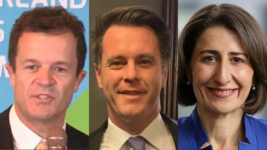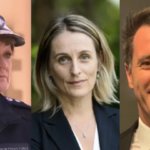Minns Continues to Follow Coalition Playbook on Drug Law Reform: This Time Positively

The last few weeks had seen newly-minted NSW premier Chris Minns reverting back to the 2018-19 Liberal Nationals rhetoric on drug reform, which was the summer that saw five people die in drug-related circumstances at festivals, and spurred an inquiry into the drug ice and an inquest.
However, Minns had catapulted himself back pre-ice inquiry, pre-NSW state coroner Harriet Grahame’s findings and pre-anything but the suggestion of taking a zero-tolerance approach to drugs: the stance that Gladys Berejiklian was sticking to in 2018.
This caused something of a stir. Not just because the Uniting Church and 70-odd other prominent organisations have been calling for decriminalisation of personal drug use since 2018, but because the leader of NSW Labor had gone to the last election promising drug law reform via a summit.
So, it was much to the applause of supporters of drug reform that on 9 October, Minns pitched his new depenalisation scheme, which is a system that will see those found in possession of a personal amount of an illicit drug receiving a fine, instead of a criminal charge, up to two times prior to being charged.
In a release congratulating the premier the following day, Uniting NSW.ACT pointed out that this means there is now a “bipartisan approach to drug laws” in this state, as Minns’ new strategy was first put forward by NSW Coalition leader in opposition Mark Speakman back in November 2020.
Speakman’s resuscitated reform
NSW Labor’s 10 October press release on the drug law reform outlines that NSW police officers will be able to, at their own discretion, issue up to two $400 on-the-spot fines to individuals found in possession of a personal quantity of an illicit substance.
“The scheme will encourage people who get a criminal infringement notice to complete a tailored drug and alcohol intervention and, if they do complete it, then their fine will be treated as though it was paid,” outlines the Labor statement, which adds that if they fail the program, the fine stands.
Introduced into state parliament on the same day, the Justice Legislation Amendment (Miscellaneous) Bill 2023, contains the changes. It will see new section 23B inserted into the Fines Act 1996 (NSW), which will permit the “completion of certain activities” to be “treated as payment”.
The release mentions that it was the Perrottet government that asked NSW police and Health to consider this scheme. But it doesn’t state that when Speakman, then attorney general, first put it to the Berejiklian cabinet, it contained an initial warning instance prior to any fines being issued.
This on-the-spot fining scheme was first raised by the NSW ice inquiry, as an alternative to drug decriminalisation, which is its chief suggestion to the drug issue in this state. Indeed, the state coroner also recommended decriminalisation in its coronial inquest into music festival deaths.
Decriminalisation involves the removal of criminal penalties for the possession of a quantity of an illicit substance that’s deemed personal.
However, under depenalisation, the Minns-Speakman scheme, drug possession and use remain criminal acts that are initially punished via a fine unless a treatment program is completed.
Head in the sand
Then NSW premier Gladys Berejiklian commissioned Professor Daniel Howard SC to conduct the icy inquiry in November 2018, which was at a time when drug law reform was front and centre in this state, as two young people had died at that year’s 15 September Defqon.1 festival in Sydney.
The political climate in this state is strangely similar at present, as in August, Minns stalled his pre-election drug law reform promises, as he pushed back a pledged NSW drug law reform summit for a couple of years.
However, following this, on 30 September, two young men died at the Sydney Knockout music festival.
Minns made his backflip on his election promise as the ACT Labor-Greens government oversaw its decriminalisation laws come into play on 28 August. And the NSW premier stated he had “no mandate” to do the same and he outlined he wouldn’t be holding the summit until late in the term.
Drug law reform group Unharm further held a press conference on 11 September, calling on premier Minns to consider pill testing, which is a system that lets people check the content of their illegal drugs, so they can then make an informed decision on whether they still want to take them.
Pill Testing Australia has been operating a fixed site drug checking service in the ACT since mid-last year. However, again, Minns said no to pill testing, despite its having saved lives in Europe since the mid-1990s, and three weeks later, the two men died at an event in drug-related circumstances.
And just like Berejiklian did following the two September 2018 music festival deaths, Minns has continued to rule out pill testing, and he’s borrowed the Coalition’s favoured phrase in doing so, which sees him stating that the harm reduction intervention is “no silver bullet”.
Discretionary issues
NSW has been operating the cannabis cautioning scheme since 2020, which gives police the option of issuing warnings to adults found in possession of a personal amount. However, over 2020-21, over 15,000 cannabis arrests were made in NSW and around 90 percent were consumer offences.
And in response to the festival deaths of the summer of 2018/19, since the 25th of January 2019, NSW police officers have had the discretion to issue fines instead of press charges for any individual who is found in possession of certain quantities of illicit substances.
So, instead of charging someone with personal possession, officers have the discretion to issue an on-the-spot $400 fine for a small quantity of MDMA, 0.25 grams, in capsule form, or a traffickable quantity, 0.75 grams, in any other form, as well as a small quantity of any other illegal substance.
But despite officers having the discretion to issue fines rather than arrest, over the five years to 2017, police pursued 80 percent of First Nations people in possession of a cautionable amount of cannabis through the courts, whilst only 50 percent of non-Indigenous people were treated the same.
“The NSW government has today announced its intention to extend the existing infringement notice system that currently applies to MDMA at music festivals to apply to all drugs and all places,” said Uniting NSW.ACT general manager of advocacy and external relations Emma Maiden.
“This is a good step forward, but the proposed imposition of a large $400 fine is clearly most damaging to those who can least afford it,” she continued in her 10 October statement.
“The proposed reform plan for these fines to be discharged by being referred for a health intervention is a recognition of what we have long been saying,” Maiden added in conclusion. “Drug use and dependency is a health issue and should be treated as such.”







